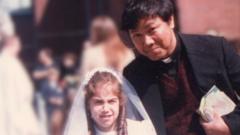In the shadows of a monumental decision by 133 cardinals convened in Rome to elect a new pope, questions arise concerning the legacy of Pope Francis, particularly regarding his management of sexual abuse scandals within the Catholic Church. Despite acknowledging victims and implementing reforms, many survivors believe his efforts were insufficient.
One such survivor, Alexa MacPherson, endured years of abuse from a priest beginning at the tender age of three. Shadowed by the weight of her memories, she shared her harrowing experience during our meeting at Boston's waterfront. Discovering something most distressing, her father reported the abuse, leading to a court hearing in 1984. However, unbeknownst to the family, behind the scenes, the Church was working to shield the priest from scandal.
The then-Archbishop of Boston, Bernard Law, indicated in a correspondence that measures were being taken to protect the Church's reputation rather than the victims. Reflecting on her experience, MacPherson acknowledged that her abuse occurred long before the papacy of Francis, but the issue has persisted—now a defining crisis for the Church.
MacPherson expressed frustration with the systemic exploitation of children and the belief that Pope Francis fell short in addressing these challenges. "While he did some things, it’s not enough,” she expressed. Calling for accountability, she urged for transparency in revealing the Church's handling of abusive priests.
The controversial history of the Church was further illuminated when Archbishop Law’s letter, written shortly after MacPherson's father's complaint, became public in 2002 as part of a Boston court order compelling the Church to release documents related to abuse cases. This revelation triggered a wave of claims from victims who came forward, prompting the Boston Globe to bring their stories into the public eye.
Victim advocacy attorney Mitchell Garabedian reiterated the necessity of change, emphasizing that many documents remain undisclosed and that the Church continues to keep secrets regarding its internal investigations. While Pope Francis initiated discussions aimed at reform, his actions did not compel full cooperation with civil authorities regarding child abuse cases.
As the Church enters a new phase with the selection of a new pope, MacPherson, now 85, continues to seek justice, advocating for the exposure of predatory figures. Her deep-seated hopes for changes in policy remain tethered to a stark reality: current Church governance continues to shield offenders behind canon laws.
The Catholic Church remains mired in the legacies of past transgressions, and survivors like MacPherson are left yearning for comprehensive reforms. As the cardinals cast their votes, a crucial question looms on whether the forthcoming leadership will genuinely acknowledge the need for accountability and reform, or repeat the mistakes of the past.




















